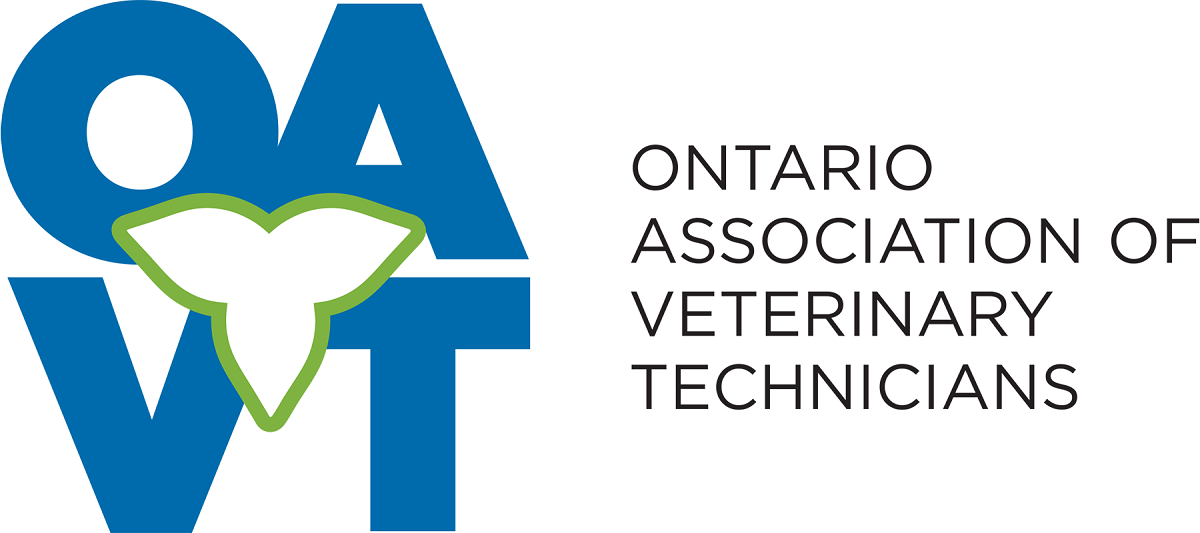ONgoing CE Opportunities
Ongoing CE Opportunities
The postings are categorized and sorted alphabetically for your convenience; they are not displayed in any order of priority or preference by OAVT. New postings are added regularly.
Table of Contents
College Programs/ Certificates/ Diplomas

This program will teach students the importance of providing an appropriate environment for a wide range of animals in both short and long term rehabilitation situations from an ecological viewpoint. The program will give students a solid foundation on wildlife rehabilitation knowledge, diagnostic and nursing skills gained through practical experience. Graduates will be able to explore a wide range of career opportunities in both the private and public sectors, including employment in natural resources, zoos, and wildlife parks, avian rehabilitation centers, natural bird sanctuaries, orphanage programs and any small or large animal veterinary clinic that receives injured wild animals. Worth 20 CE credits upon completion of program.

A graduate one-year certificate program for RVTs in response to emerging animal health care needs. Worth 20 CE credits upon completion of program
Book a seminar/Lunch & Learn or in-person course
Online Opportunities
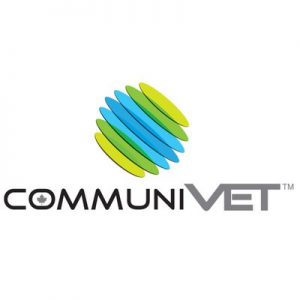
This webcast will be available for on-demand viewing as of September 10. https://www.communivet.com/en/ca/education/webinars
Summary: In this free webinar, Dr. Raj Naik will discuss the benefits of specific nutrients for brain development and brain aging.
Objectives: Targeted nutrition can help support brain function, but nutrition for brain health is often overlooked. The objective of this presentation is to provide the audience with an overview of the benefits of specific nutrients for brain development and brain aging, specifically addressing conditions such as cognitive decline and cognitive dysfunction syndrome. The presentation will also discuss the role of the gut–brain axis in brain health as a growing area of research and pathway for dietary invention.
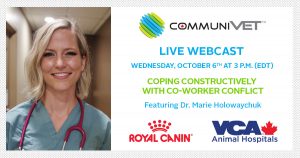
This is a 60-minute webinar which will be available as of October 7, 2021.
With veterinary hospitals functioning at maximum capacity and often short-staffed, emotions are running high, and everyone is feeling stressed. At times like these, it is easy to snap at a colleague or become disgruntled with a co-worker, especially during disagreements over case management or scheduling. Research suggests that teams who can effectively communicate and resolve conflict provide better patient care and have higher job satisfaction than teams who avoid conflict or, worse, talk behind each other’s backs.
During this webcast, veterinary wellness advocate and Thrive! collaborator, Dr. Marie Holowaychuk, will discuss strategies for:
– effective team communication, including proactive problem solving and conflict resolution;
– addressing inappropriate behaviour.

Creating a cat-friendly experience with feline synthetic pheromones
Presented by Dr. Kelly St. Denis
Reducing stressors and promoting positive emotions can help put our feline patients at ease during visits to the veterinary clinic. In this webcast, Dr. Kelly St. Denis will discuss how to create a cat-friendly environment, both at home and in the hospital. She will share simple tips and tricks to help alleviate the stress associated with clinic visits and to improve the cat’s experience. She will explain how synthetic feline pheromones can foster a sense of familiarity and security, setting the conditions for a successful visit.
OAVT CE – 1 credit

Join us as two renowned experts in pet nutrition, Dr. Julie Churchill, DVM, PhD, DACVN, and Dr. Sarah Abood, DVM, PhD share a comprehensive overview on why having nutrition conversations with clients is important and how veterinary health care teams can include nutrition conversations in their daily clinical practice. This fun and interactive presentation promises to help give teams practical tips and tricks that these experts have learned over their careers.
Objectives:
- Participants will understand that there’s a framework to each nutritional conversation: assessment, recommendation, follow‐up to evaluate & record outcome
- Participants will review key communication skills for addressing potentially difficult nutrition conversations
- Participants will appreciate specific scenarios to apply their communication skills to address nutrition‐related questions
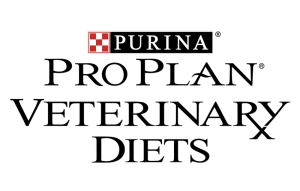
New from Purina Pro Plan Veterinary Diets, the Daily Nutrition Matters online portal features a series of nutrition modules. To register for a free account, visit their website.
- Nutrition 101 – 3.5 CE Credits (No prerequisite
necessary) - Nutrition 201 – 2.5 CE Credits
- Nutrition 301 – 6 CE Credits
- Nutrition: Canine and Neurological and Cognitive Health – 2 CE Credits
- Nutrition: Weight Management – 1.5 CE Credits
- Nutrition: Myths & Facts – 2 CE Credits
- Nutrition: Are you a Nutrition Champion? – 0.5 CE Credits (No prerequisite necessary)

This is a 75-minute webcast, which is available for on demand viewing as of February 18, 2022.
Join us for a panel discussion that will feature the new osteoarthritis (OA) treatment guidelines, and provide insights into the way experts choose an OA treatment plan. OA affects many dogs’ quality of life, and the information provided will be invaluable in helping you better manage chronic cases.
The Canadian Osteoarthritis Treatment Guidelines were created by a Canadian Advisory Board composed of nine OA experts. Their goal was to develop clinically practical and evidence‐based treatment guidelines and considerations Canadian veterinary practitioners can use to treat and discuss canine OA. The guidelines offer treatment recommendations for the various OA stages, according to the Canine OsteoArthritis Staging Tool (COAST).
This panel discussion features members of the Canadian Advisory Board Dr. Conny Mosley, Dr. Laura Romano and Dr. Terri Schiller; hear how they approach OA treatment by leveraging the new Canadian OA Treatment Guidelines.
Link to watch on-demand version: https://www.communivet.com/en/ca/education/webcasts/osteoarthritis-treatment-options
When used according to the therapeutic decision cascade for animal and public safety, compounded medications can provide effective treatments for veterinary patients.
In this presentation, our two speakers will share valuable information regarding the judicious use of compounding. They will also discuss the benefits that these products can provide if approved veterinary drugs are not available or if their format is not appropriate for patients.
Hosted by Dr. Craig Mosley, National Medical Director of Specialty Medicine at VCA Canada, this webcast will feature:
· a 15-minute presentation by Dr. Danny Joffe, Vice President of Medical Operations at VCA Canada;
· a 15-minute presentation by Sebastian Denison, Pharmacist at PPCA;
· a 30-minute open Q/A discussion.

Dr. Lana Bissett B.Sc Hons, DVM (Practice Limited to Veterinary Dentistry)
Join this online CE and learn how the importance of good dental radiography techniques and assessments that can eliminate bigger issues with your patients.
Basic best practices can start with your wellness exams and communication around dental hygiene, and the need for full mouth radiographs as a standard.
Dr. Bissett will review radiography positioning tips and tricks, anatomy, breed pre-dispositions, and recognizing pathology and cases.
Registration to this CE course includes 3 months access.
$159
Dental Radiography Best Practices – Improving the outcomes of our Patients

Dental Radiography Positioning Tips and Tricks with Amy Birchall RVT
Join Amy Birchall as she takes you through her tips and tricks for taking diagnostic full mouth dental radiographs in this recorded presentation.
$159

Speaker: Jangi Bajwa, BVSc and AH, Dipl. ACVD. What is the diagnostic process for dogs presenting with a suspected skin disorder? In addition to performing a physical examination, what other steps are required before reaching a final diagnosis of canine atopic dermatitis? What management approach is recommended in case of canine atopic dermatitis? Find out the answers to these questions during this comprehensive discussion on the diagnostic workup of canine atopic dermatitis in dogs.

The Canadian Academy of Veterinary Dermatology contributed in the development of this learning activity. What role does telemedicine play in your practice? Does this technology have its place in the management of patients with dermatological issues? Now is your chance to get answers to these and other questions about the use of telemedicine in dermatology from a panel of veterinary specialists!

Dermatopicals: Why to incorporate a topical recommendation for every derm patient and tips and tricks on improving owner compliance and success
Dermatology cases present both a challenge and an opportunity to approach case management collaboratively with clients. The goal is to empower clients to make a difference in managing their pets’ skin concerns. Often this starts with making a topical recommendation to help them care for their pet’s largest organ when it needs our help. Dr. Cox will discuss how the skin’s barrier functions become disrupted during disease states, and how to approach managing this problem with the use of topical therapies to mitigate frustrating chronic relapse cycles.
Having success with your derm cases all hinges on those pet parents executing your prepared treatment protocol. Things can get a little dicey with multimodal treatments (a dermatology staple) and one of the first things to get derailed is topical treatments. Jennie Tait will share a few pearls of wisdom with you after working in a dermatology referral practice for the past 22 years. Tune in to get a few insights on how to communicate to owners the importance of topicals and how to improve compliance.
If you’re new to selecting topical treatments for dermatology cases, hopefully you will leave this discussion seeing the value of dermatopicals for patients & clients alike.
Link to watch on-demand version: https://www.communivet.com/en/ca/education/webcasts/dermatopicals
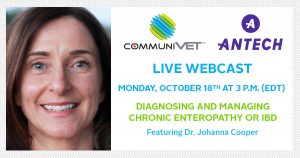
Learn more on diagnosing chronic enteropathy. Vomiting, diarrhea, and other gastrointestinal signs are among the most common reasons for a dog to require a visit to the veterinarian. Ascertaining the cause of these signs is often a time‐consuming task for clinicians and a frustrating and expensive process for pet owners, especially in the case of a complex condition like chronic enteropathy, more commonly know as inflammatory bowel disease. In this session, we will discuss how the Canine CE‐IBD Assay can help better diagnose and monitor patients with chronic enteropathy with a simple and affordable blood test.

DITCH THE CHILL PILL! Pet parents are seeking non-prescription ways to support behaviour concerns in dogs and cats
Presented by Dr. Collen Wilson
More and more, pet parents are seeking solutions to common problems that are safe, have fewer side effects, and can cost less than prescription medications. The pet population is aging, and clients are looking for ways to ensure their pets maintain the highest quality of life. Clients themselves are having success using supplements and that interest is transferred to their pet’s health. Though pet parents can access supplements from several sources, using natural supplements to help manage a pet’s behaviour should be guided by the veterinary team. This will optimize the best outcome.
During this webcast, Dr. Colleen Wilson will review research-backed ingredients to help your pet parents choose natural solutions that can help support common behaviour concerns like stress and anxiety. She will cover the subtle signs of anxiety in dogs and cats that pet parents often miss or underreport to the veterinary team. She will identify where, when, and how to choose a natural supplement and why early intervention is key when it comes to managing pet behaviour. When we identify anxiety early, we can eliminate more severe behaviour issues that lead to owners choosing relinquishment or euthanasia.
OAVT CE: 1 credit

Malnutrition is much more common in veterinary patients than you may realize. Drs. Bersenas and Parr will discuss why early enteral nutrition, using feeding tubes, should be a priority for critically ill cats and dogs. They will also talk about key nutrients for recovery and provide dietary examples. Lastly, they will utilize common case examples to demonstrate appropriate feeding strategies when using feeding tubes.
This program includes weekly sessions for 8 weeks. Mindfulness Based Stress Reduction (MBSR) is an evidence-based program that offers participants the possibility of developing a different relationship to stress through mindfulness movement and meditation. The majority of MBSR participants report lasting decreases in psychological and physical symptoms exacerbated by chronic stress (such as chronic pain, sleep disturbances, and anxiety).. Completing the full program has been approved for 2 credits with the OAVT, under Category 3.

Otitis externa is defined as inflammation of the external ear canal and can lead to pain, pruritus, and lesions within the external ear canal. Chronic otitis externa can be a challenging condition to manage and can lead to high levels of frustration for both clients and their pets. In this lecture, we will review all factors contributing to otitis development and ways to better manage those difficult otitis cases in the clinic.
During this webcast, learn from veterinary dermatologist, Dr. Charlie Pye, as she presents:
• an overview of the ear canal;
• inflammation and lesions in the external ear canal;
• signs and symptoms of otitis externa;
• factors contributing to otitis externa and how to mitigate and manage them;
• a case study with tips on how to manage canine otitis externa.

Emerging trends in ticks and tick-borne diseases
The tick population has expanded in recent years, and the diseases they carry have become more prevalent.
During this webcast, Dr. Katie Clow will present an overview of the current status of tick populations in Canada, as well as the data on pathogen risks.
OAVT CE – 1 credit

Nearly 200 veterinary professionals recently responded to a CommuniVET survey to share their opinions and practices related to weight management programs for dogs and cats. This presentation is your chance to review the survey with a panel of three Canadian veterinary experts

Presented by Dr. Kilborn, Dr. Mirkovic and Dr. Moore
Pet parents find it very stressful to deal with the onset of acute GI upsets in their pets; they are seeking a quick resolution, and turn to you and your team to find a solution. Even though antibiotics have their place for treating some gastrointestinal diseases, they also negatively affect the microbiome. For mild, uncomplicated acute GI upsets, all-natural alternatives are available, which have been proven helpful in the resolution of acute GI upsets without causing any harm to the gut microbiome. New tools developed by veterinarian specialists are at your disposal to assist in reducing the workload for managing mild uncomplicated acute GI upsets.
During the webcast, veterinarian specialists with expertise in gastroenterology, infectious diseases and education will share how to engage your entire team in the management of mild, uncomplicated acute GI upsets. This approach is adaptable to all clinics, and offers favourable results for you, your clients and their pets.

This is a learning activity on the topic of euthanasia, with two components:
1. An on-demand webcast, entitled “Euthanasia – Reducing stress while adding value”.
In this webcast, Dr. Mason shares tips to help veterinarians, as well as other members of the in-clinic team, to better assist pet owners in making this most difficult decision. Special attention is given to communication by reconsidering the vocabulary to use and the relevant information to share. She also talks about the logistics related to euthanasia appointments in order to improve the experience for everyone involved, while providing tips on self-care for veterinarians and in-clinic staff.
2. A video snapshot, entitled “Pre-euthanasia sedation – Winning protocols!”
The well-being of their faithful companions during end-of-life care is absolutely paramount for pet owners. In this Scientific Snapshot, Dr. Céline Leheurteux, creator of Euthabag®, examines why sedation should be part of the euthanasia process. Among other things, she discusses practice standards, the two-injection technique and the benefits of sedation. She also shares magic protocols to make the experience as pleasant as possible.

With the changes in practice standards that have taken place recently, many veterinary practices have had to acquire a dental x‐ray system. Thus now, they are obtaining dental x‐rays, but what are they looking at exactly? This presentation should help to clarify dental and oral anatomy as seen in shades of grey and in 2 dimensions. The presentation will cover some of the most common pathologies encountered in veterinary dentistry.
Link to watch on-demand version: https://www.communivet.com/en/ca/education/webcasts/dental-x-rays
Available as of February 23, 2022

Fear Free is an organization whose mission is to reduce or eliminate Fear, Anxiety and Stress (FAS) in pets by inspiring and educating those who care for them. During this one‐hour webcast presentation, Dr. Jonathan Bloom will talk about what Fear FreeSM is, why it’s important, as well as the negative impact that FAS has on pets and their owners. He reviews the many signs of FAS and how to address them. He will also discuss the most important and impactful changes in veterinary medicine in terms of managing FAS, while elevating the level of healthcare provided by veterinary teams to ensure the well‐being of all parties involved.

Field anesthesia in horses: tips, tricks & pitfalls
During this webcast, Dr. Daniel Pang and Dr. Shannon Lockhart will review key concepts and options for
equine field anesthesia, including:
• common drug choices for field anesthesia, with a discussion of their advantages and disadvantages;
• differences between midazolam and diazepam, and their impact when included in the anesthetic protocol;
• options for extending general anesthesia under field conditions; and,
• anesthetic monitoring: assessing depth of anesthesia and monitoring equipment.
OAVT CE Credit: 1

This is a 60-minute webinar.
Link to watch on-demand version: https://www.communivet.com/en/ca/education/webcasts/fight-back-against-periodontal-disease
Understanding periodontal disease is an important first step in controlling the disease and the impact it has on patients. This webinar will retrace the pathogeny of PD, with a focus on how to convey to clients the importance of the disease and its prevention. Home care will be thoroughly discussed.
